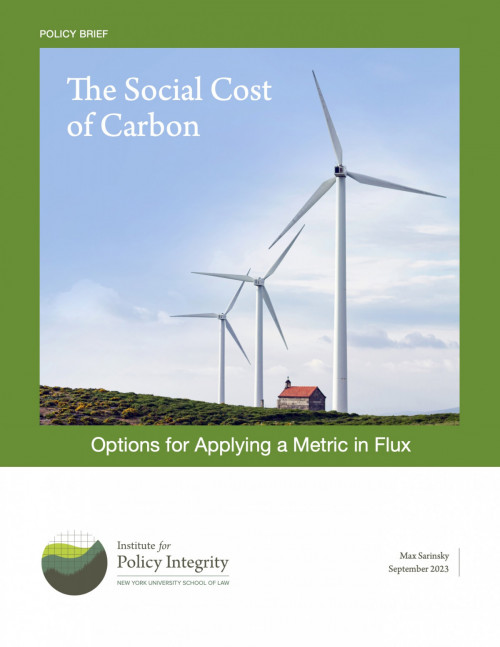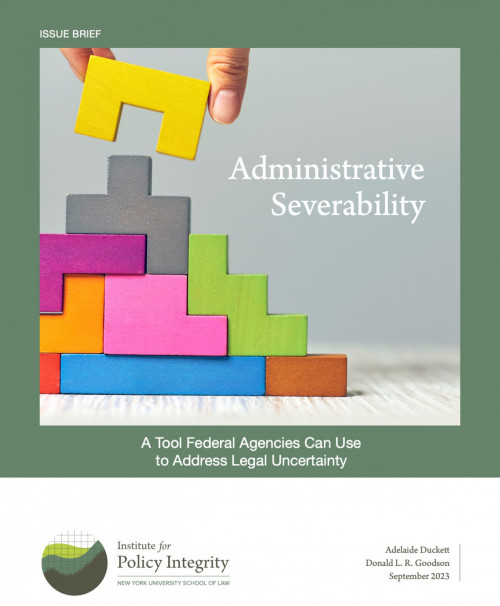-
Comments to BLM on the Coastal Plain Supplemental Environmental Impact Statement
The 2017 Tax Act directed Bureau of Land Management (BLM) to conduct two sales in the Arctic National Wildlife Refuge (ANWR) area known as Coastal Plain totaling at least 400,000 acres by 2024. BLM released a final environmental impact statement (EIS) in September 2019 considering the over 1.5 million-acre area in the ANWR and held the first lease sale in January 2021. Later in 2021, the agency placed a moratorium on all activities relating to BLM’s Coastal Plain leasing program, announced that the analysis conducted in 2019 was legally deficient, and began to prepare a supplemental environmental impact statement. We filed comments on this new EIS and arged that the presentation of climate costs and benefits in the analysis could be made more complete and balanced.
-
Policy Integrity Comments Influence Order from Michigan Public Service Commission
In October 2023, the Michigan Public Service Commission issued an order in the benefit cost analysis (BCA) matter for which we filed comments in June. The order adopts several of our recommendations, and specifically cites us for several of them.
-
Comments to NHTSA on New Corporate Average Fuel Economy Standards
In August 2023, the National Highway Traffic Safety Administration (NHTSA) proposed a regulation to strengthen corporate average fuel economy standards for passenger cars, light trucks, and heavy-duty pickup trucks and vans. In a comment letter, we explain that while the Proposed Rule and its accompanying regulatory impact analysis offer useful starting points, NHTSA should take further steps to ensure the complete presentation of regulatory benefits and costs and should select a regulatory option that best promotes social welfare, consistent with the agency’s legal obligations. We also submitted joint comments with a coalition of other environmental groups on NHTSA’s use of the social cost of greenhouses gases in the Proposed Rule.
-
Policy Integrity Work Shapes FTC Ban on Hidden Fees
In October 2023, the Federal Trade Commission (FTC) released a proposed rule that bans the use of “junk fees” in transactions including hotel reservations, vehicle rentals, and event ticket purchases. The proposed rule references Policy Integrity and our work more than a dozen times, including both our 2021 petition for rulemaking and our 2023 comment letter supporting the FTC’s authority to issue this regulation.
-
Comments to FERC in Support of Technical Conference on Capacity Accreditation
Policy Integrity submitted comments to FERC in support of American Clean Power Association’s petition for a technical conference on capacity accreditation. Holding a technical conference would be appropriate because accurate accreditation is becoming increasingly difficult as grids accommodate rapidly changing resource mixes with varying energy and reliability attributes, public policy constraints, and increasing/unprecedented extreme weather events. Moreover, accreditation has become more consequential, as capacity market revenues have grown to a significant share of total market payments. We included several questions that would merit discussion at the technical conference.
-
Comments to DOE on Coordination of Federal Authorizations for Electric Transmission Facilities
The Department of Energy (DOE) issued a proposed rule under 16 U.S.C. § 824p(h) to expedite the federal authorization of transmission projects. We commented in support of the proposal, including DOE's proposed requirement that project proponents describe how the transmission project would affect power-system greenhouse gas (GHG) emissions. We recommended that DOE clarify that project proponents must also estimate changes to non-power-system GHG emissions (e.g., upstream emissions of natural gas) and power-system emissions of local air pollutants. We also suggested that DOE provide additional guidance on the meaning of terms like "disadvantaged communities" and "communities with environmental justice concerns." Finally, we argued that DOE should provide an opportunity for public comment at the pre-application stage of the process.
-
Comments to CEQ on Proposed Revisions to NEPA Implementing Regulations
In July, the Council on Environmental Quality proposed revisions to the implementing regulations under the National Environmental Policy Act. The Proposed Rule reflects a more holistic approach to informing agency decisions with a robust and balanced analysis of environmental impacts. In our comment letter, we suggested improvements to the proposal that would help ensure robust and balanced treatment of environmental impacts in NEPA reviews.
-

The Social Cost of Carbon
Options for Applying a Metric in Flux
Many states and other jurisdictions are grappling with how to value greenhouse gas emission reductions and trying to understand the rapidly developing climate economics and science involved in this task. Frequently, state governments and other jurisdictions value greenhouse gas emissions in policymaking using a tool known as the social cost of carbon.
While applying the social cost of carbon is conceptually simple, the appropriate value to place on the metric is in flux. In late 2022, the federal government released new, updated values of the social cost of carbon in draft form which, for now, remain unfinalized. So what estimates of the social cost of carbon should states and other entities use during this transition period? This policy brief explores the available options.
-

Administrative Severability
A Tool Federal Agencies Can Use to Address Legal Uncertainty
Several recent developments in administrative law—namely the Supreme Court’s embrace of the major questions doctrine and decision to hear a case asking it to overrule or clarify Chevron deference—have left federal agencies uncertain about how regulations will fare in litigation. Agencies adapting to this uncertainty may want to pay closer attention to recent case law on administrative severability, which allows a court to sever the invalid portion of a rule while leaving the rest intact.
-
Comments to NJBPU on the Development of Natural Gas Utility Emission Reduction Plans
The New Jersey Board of Public Utilities is examining how to reduce greenhouse gas emissions from the state's natural gas sector in line with New Jersey's economy-wide emissions reduction goals. Policy Integrity submitted comments focused on the planning process and solutions needed to responsibly transition away from natural gas usage.










